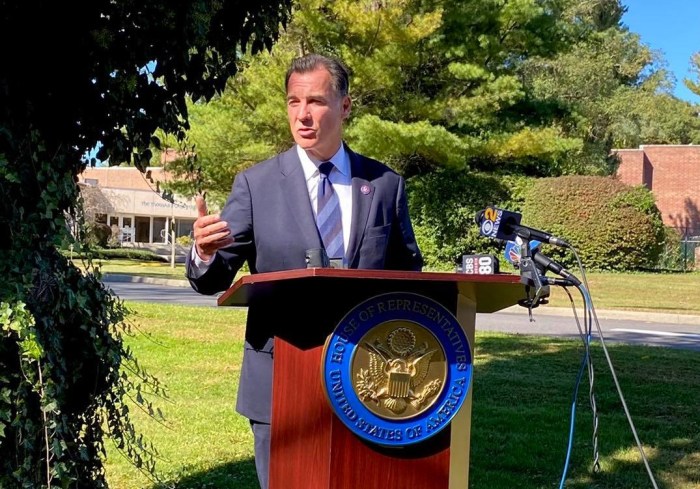Pediatrician Shares How to Start Your Kids Off on a Healthy School Year
Children are headed back to the classroom, filled with excitement. Still, going back to school can mean a big transition physically and mentally for kids and their families, especially after facing so many unknowns over the last two years.
As a physician in pediatric care at Northwell Health-GoHealth Urgent Care, I’ve spent 10 years caring for kids. And as a mom, I’ve developed 12 recommendations to help children start the school year feeling their best.
- Check in frequently. The mental and physical well-being of 73 million American kids is at risk and getting worse. When kids face challenges, parents need to listen to them, validate their emotions, and remind them of previous successes when they showed strength. Children may not share feelings immediately, so connect over a fun activity like a game, a puzzle, or a walk.
- Engage with their teachers and schoolwork. If your child is nervous about the first day, set up a meeting with new teachers before school starts or during the first few weeks of the term to get acquainted and learn their teaching style. When school starts, review your child’s school folder together nightly, praising successes and talking through struggles.
- Establish a routine. Partner with your child to develop a routine that your child can own with your support. This helps to build confidence, instill self-discipline, and give a sense of security. Set an alarm in the mornings, eat breakfast, and leave the house at the same time daily. In the afternoons, children should do homework at the same time and location each day.
- Get regular physical activity. Physical activity in kids across the world declined by 20% during the pandemic, so it’s time to get moving again. The U.S. Centers for Disease Control and Prevention (CDC) recommends school-aged children get 60 minutes or more of moderate-to-vigorous physical activity daily. Incorporate activities based on your interests, time, and resources. Consider encouraging children to participate in sports, take after-dinner family walks, or visit a park and play catch as a family.
- Keep them hydrated! Drinking enough water regulates body temperature, supports joints, gets rid of waste, and may even improve cognitive function in children. The American Academy of Pediatrics recommends kids and teens drink five to eight cups of water per daily, depending on age. Kids can start the day off right with a full cup of water or milk. Double-check to make sure their water bottle is full when they go to school and empty when they return. Refill it once they are home.
- Establish a solid bedtime routine. Kids need anywhere from 8 -12 hours of sleep depending on their age. Help kids quiet their minds by setting a bedtime routine: Include bathing or showering, brushing teeth, getting in jammies, and snuggling while reading books for 20-30 minutes together. Avoid screens two hours before bedtime, focusing more on quiet activities. Consider downloading a sleep app with sleep stories, sounds and meditations.
- Involve kids in making healthy lunch choices. When packing my kids’ lunches, I like to provide two or three choices. Thermoses are great for a hot lunch of leftovers or soup. If your child is a snacker, offer to fill a container with deli meat, cheese, crackers and fruit. I always pack a vegetable, and even if it is left untouched, it provides a good reminder of its nutritional importance. Find healthy foods the whole family loves while including the occasional treat – everything in moderation.
- Protect against upper respiratory infections. When back-to-school season transitions to holiday season, health experts agree we will see an uptick in cases of Covid-19, influenza, and the common cold. The top preventatives include up-to-date vaccinations such as Covid-19, boosters, and flu shots.
Good hygiene counts too. Put hand sanitizers in backpacks and in the car. Have kids wash hands when returning home. Teach them to cough into the corner of their arm. If they get sick, contact your pediatrician to see if they need an evaluation. Keep them hydrated. Children should pee at least four-to six times daily. If it’s less than that and they’re vomiting or not drinking, they need to see a healthcare provider.
- Review and update immunizations. From Covid-19 and human papillomavirus vaccine (HPV) vaccines to tetanus and flu shots, immunizations ensure that families stay healthy with protection against some of the most common – and preventable – diseases. Work with your family physician and school administrators to make sure your kids are current on all required immunizations. Make an appointment as soon as possible if you are behind on any school-required vaccinations.
- Set and communicate allergy and asthma action plans. If your child has asthma or an allergy that can cause anaphylaxis, have a documented plan in place in case of emergency. Make certain that the school has your child’s EpiPen and inhalers on hand and your child’s teacher is familiar with the plan.
- Stock your medicine cabinet. Include prescriptions, over-the-counter medications, a thermometer, ice packs, and a first aid kit that includes Band-Aids in all sizes. Stock your preferred pain-reducing/anti-fever medication. Ask your pediatrician what the correct dose is now, so it’s available for those nighttime fevers. Keep Pedialyte drinks or popsicles on hand for rehydration when your child is ill. Avoid juice, soda, or Gatorade.
- Know your options for after-hours medical help. Plan where you will take your child if sick or injured after business hours. Save your pediatrician’s after-hours phone number, so it’s ready for middle-of-the-night questions.
Determine which after-hours resources are accessible. Northwell Health-GoHealth Urgent Care is open 8 a.m. – 8 p.m. every day with virtual and in-person care that is designed for kids and staffed by experienced pediatric providers. With 55 urgent care centers across New York, we treat patients ages 6 months and older for non-life-threatening conditions, including flu, fever, earaches, insect bites, sprains, simple fractures, and cuts requiring stitches.
Erika Mark, DO, is a pediatrician at Cohen Children’s Northwell Health-GoHealth Pediatric Urgent Care.


































